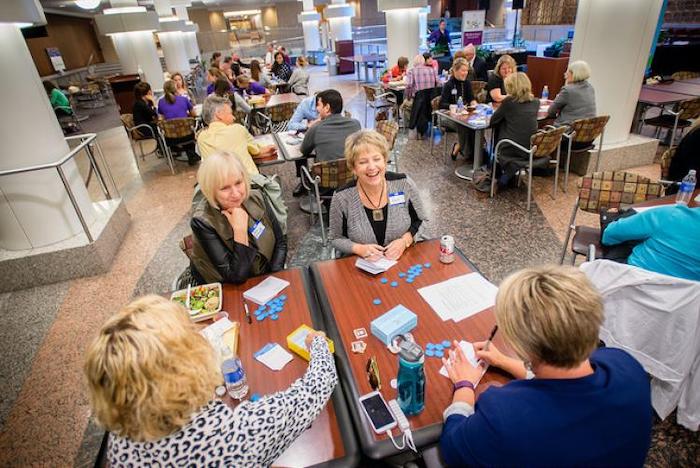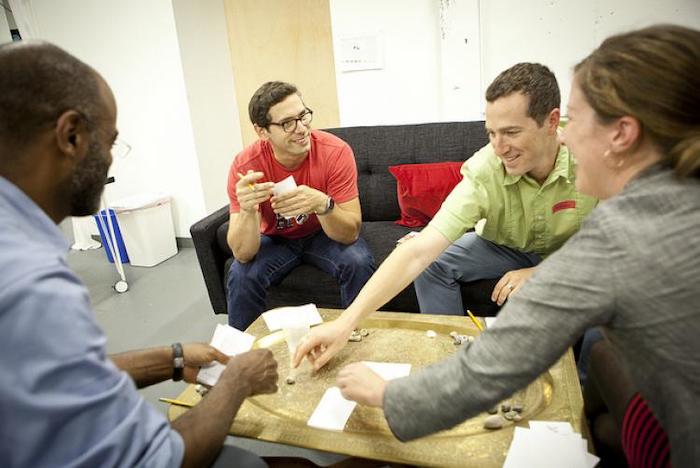
It’s game night on the top floor of a bank building in Medford, Mass., and 25 people have divvied themselves up around the circular tables. Four women, none of whom know each other well, are seated near the snacks busily discussing their future burials.
Katie Wallace, a native of nearby Somerville, is confident she wants to be cremated. But it’s a bit more complicated for her. The urns are accumulating. “I have a room in my house where I have the ashes of six different people,” she says. “So I have to figure out what to do with all of those people.”
As a lavender dusk settles outside the floor-to-ceiling windows, the women chuckle about whether Wallace should pass this “inheritance” on to a younger relative or, perhaps, invest in a columbarium.
This isn’t just small talk. It’s part of the game. These woman and men, all of whom are older, have gathered to play a card game — one with chips, a deck of cards, and a winner and losers. But this isn’t poker or blackjack.
Question 15: What music do you want to be listening to on your last day alive?
The game, called My Gift of Grace, aims to facilitate conversations about the end of life. It’s part of a growing trend: efforts aimed at encouraging talk of death well before it is imminent. From The Conversation Project to Honoring Choices and another card game called Go Wish, all seek to find ways around the usual distaste for facing death in advance, so that people can better control the care they receive at the end.
“I think we are on the early cusp of what I hope will become a groundswell of change,” said Dr. Lachlan Forrow, director of the Ethics and Palliative Care Programs at Boston’s Beth Israel Deaconess Medical Center, in a phone interview.
The idea for this game started when The Action Mill, a Philadelphia-based design firm, was interviewing a hospice nurse, remembers Nick Jehlen, who ultimately led the game’s design team.
“She said: ‘The most important thing you could do to make my job easier would be if you could make sure that everybody who shows up for me has had one conversation about the end of their life with their family, just one.’ ”
Dr. Forrow says that having that one conversation is a lot harder than it sounds; for most people, talking about death is incredibly difficult. “It is like the biggest, existential, overwhelming, huge issue for anybody: that we are mortal.”
But Jehlen and his team weren’t deterred. They set out to make that conversation a little bit easier.
A Game About The End Of Life
The first step for the design team was thinking about everything they wanted for the end-of-life conversation: they wanted it to be done in person, with a family sitting around a table together, and everyone having a pleasant time.
A card game checked all the boxes. “Nobody gets together with their buddies to play poker just to pass some cards and some chips around,” Jehlen says. “They actually go to tell stories and share insights.”
Susanne Wilkinson, one of the women sitting with Katie Wallace in Medford, says the idea of a game about the end-of-life made her “a little dubious,” but, she says, “I am more curious to see what comes out of this.”
Wilkinson, of Somerville, is willing to withhold judgment. She believes that “as a society we haven’t done this very well yet, so I am looking for any angles that might provide some avenues.”
Jehlen and the rest of his design team had the same thought. So they designed a deck of cards with a different question printed on each card.
Question 3: Write your own epitaph in five words or less.
Question 5: If you needed help going to the bathroom today, who is the first person you would ask to help you? Who would you never be able to ask?
Question 11: In order to provide you with the best care possible, what three non-medical facts should your doctor know about you?
Question 15: What music do you want to be listening to on your last day alive?
Every person answers the questions, and the other players decide whether an answer deserves a ‘thank you chip.’ The blue poker chips are meant to express gratitude for a thoughtful answer, and it’s those chips that end up determining the winner.
Jehlen says the design team wanted everyone in the family participating. The goal was to avoid focusing solely on the one person that might be nearing the end of their life.
Wilkinson particularly appreciated this element of the game. While death can be a lonely experience, she thought “the fact that it allowed you to connect with other people makes it satisfying.”
The game also sought to focus on life as well as death, since having a good death experience is often about understanding what one values in life.
Jehlen says he struggles to capture the game in words. “The problem we always run into is explaining the game is a little bit like explaining a joke.”
But he can’t remember a My Gift of Grace game where there wasn’t laughter. Recently, he was with a group of health care professionals, “in the middle of these 25 people playing the games,” he remembers. “I closed my eyes and it was just like rolls of laugher.”
Dr. Forrow was not involved in the development of the game but when he checked it out he found it to be “a wonderful blend of serious and humor.” He says that’s important but he tempers his enthusiasm.
Is The Game A Winner?
Dr. Forrow believes the jury is still out. He says there is one ultimate test for this game and for all the other efforts to facilitate an end-of-life conversation.
“We’ll find out whether it’s helpful or not by seeing people using it,” Dr. Forrow says.
The Action Mill has sold about 2,000 games since it went on sale in December.
Dr. Forrow thinks a lot more people need to be having this conversation. And, despite seeing progress, he says, “I don’t actually think anybody is yet doing a good job.”
In an effort to get more people playing the game and having the conversation, Jehlen and his colleagues had the idea of public game nights. Wallace and Wilkinson attended one of the 10 games nights that have been held across the country so far.
While the game was designed for families to play during the holidays, Jehlen says, “the feedback we started hearing was that actually playing the game, talking about end-of-life issues with strangers seemed like it was easier than maybe having this conversation with your family.”
Wallace would agree, but she has a word of warning. She says it’s comfortable either with “complete strangers or very close friends.” But when these game nights happen in small communities, there is the possibility of seeing “people you know in a very casual way,” and that, she says, is “a little odd.”
Jehlen has been viewing these public game nights as something of a warm-up for a family game night. But it’s not just families and strangers, it’s health care professionals too.

Where Does Medicine Come In?
To Jehlen’s surprise, “many of the people who are buying and playing the game are actually health care professionals.” About a third of their sales have been to hospitals, hospices and other health care groups.
On the one hand, this could be a vote of confidence for the game. But on the other hand, Dr. Forrow says, it’s helpful to have this end-of-life conversation in a non-medical context. He worries that when sitting in a doctor’s office, medical concerns dominate the conversation.
“I adamantly, firmly believe that for the conversations to be really about what really matters that they should start maybe even as far away from the hospital doctor’s office as they can,” Dr. Forrow says, “because these are much more fundamentally human issues than medical issues.”
Despite that fundamental nature of the topic, Dr. Forrow believes that it can be helpful not to think about it in such broad terms. “I think focusing on some simple concrete task that you did or did not do, like designating a health care proxy,” can make it easier, he says.
Jehlen admits there aren’t yet clear, concrete steps to take after playing the game. While many of the questions in the deck have a medical undertone, right now there isn’t a guide to help people translate game answers into a Living Will or an Advanced Care Directive. Although, he says, the game’s maker is considering putting downloadable end-of-life care forms on the website.
Regardless of what the next official steps may be, Susanne Wilkinson knows her next move: Before leaving game night, she said she wanted to borrow the game and play it again.
Complete Article ↪HERE↩!
